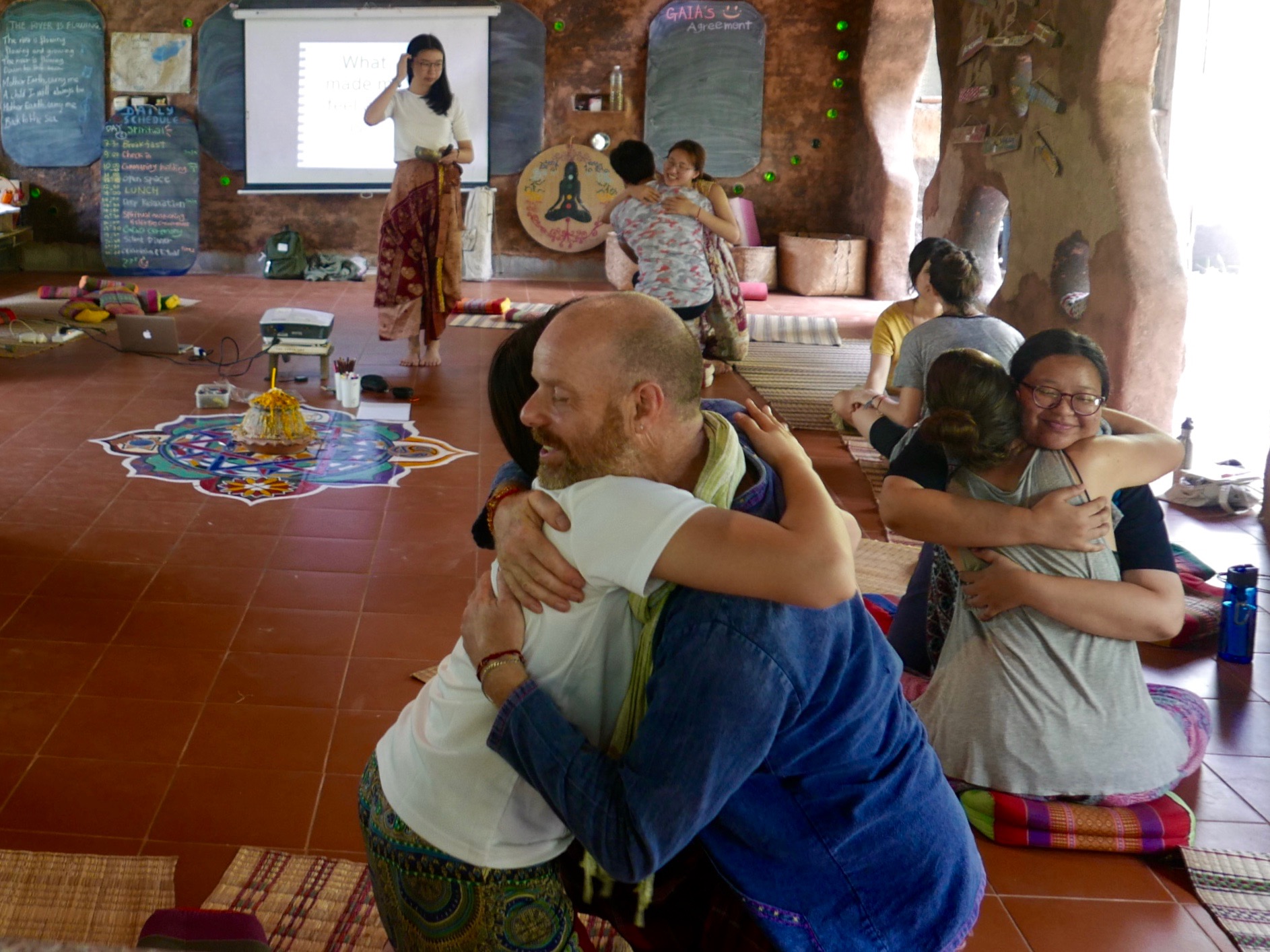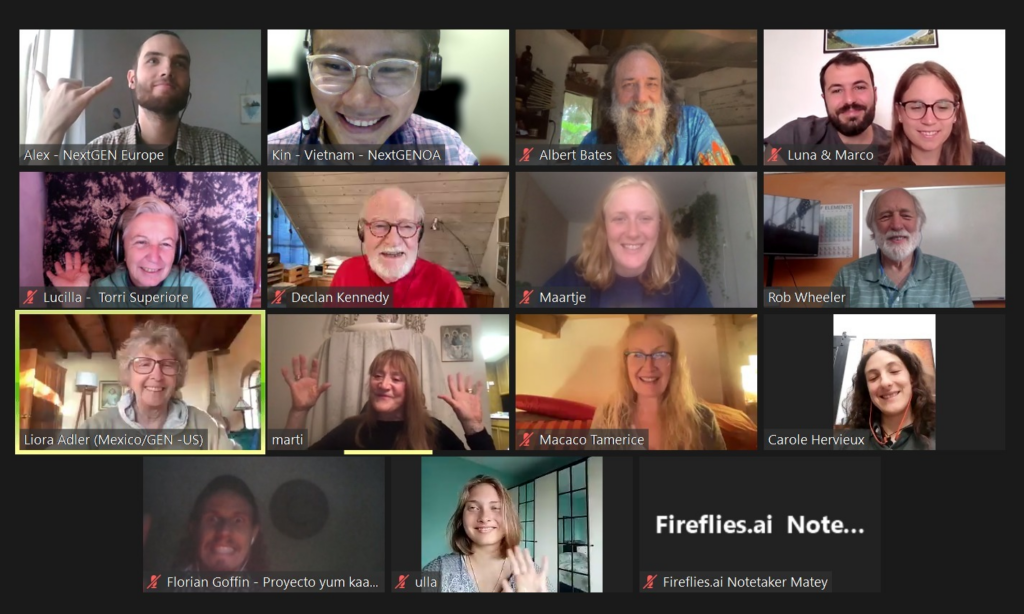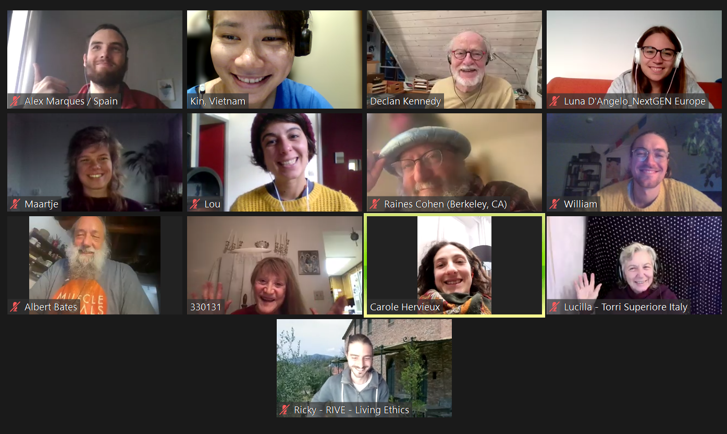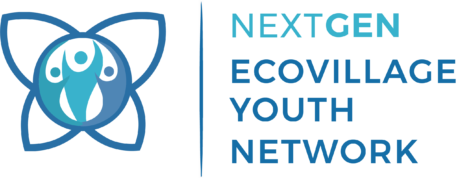
Another year of intergenerational connection
GEN ELDERS & NEXTGEN VIRTUAL FIRECHATs 2022
The Elders and NextGEN Firechats is a youth-led initiative consisting of a series of online conversations between elders and youth in the ecovillage movement, with the aim of strengthening intergenerational connection, and exchanging wisdom, with the purpose of contributing to a thriving network of projects, communities and individuals.
This year’s conversation has been focused on the topic of economic resilience for ecovillagers. We’ve had 2 conversations this year, one at the beginning of November and another at the end, and we’re happy to share with you a bit about what we have discussed 🙂

In the first meeting we openly discussed a few different points, starting with how the world has changed since the early days of the movement, when it was easier to transition from one profession to another and it was easier to acquire land. We went on to say that now, due to increased prices for land and food, many communities are struggling. Some people also mentioned that there are more people now on the planet than ever before, which has made many challenges more urgent. Elders also reflected on how community diversity is important in order to make sure that everyone feels supported and that any failures or struggles can be addressed together as a community.
We also discussed the need for community, the importance of networking locally, and the need to be realistic in one’s dreams and goals, and warned about conflicts within communities, and offered advice on how to manage them.
We also discussed the current state of the economy and how it has changed over time; and the importance of spirituality in relation to economic resilience.
One youth also shared his perspective on the current state of the economy and how it has affected young people’s faith in change, suggesting we need to focus more on reconnecting with nature and our community to rebuild our economic resilience.
The elders shared their experiences and insights on intergenerational exchange, and discussed ways to continue the conversation. An elder said that there are many opportunities for young people today due to the transition to sustainable development. They also mentioned a climate summit where government funding is available for regenerative development projects. The youth shared interests in how to create wealth while living sustainably, and how to connect with others in similar pursuits.
Everyone left the session feeling grateful about the connection and sharing between generations of GEN. NextGEN members value the sharing from elders, especially on their holistic approach to the topic – seeing it not just as a matter of economic dimension, at the same time wanting to dive deeper into the concrete topics under economic resilience.

In this second meeting, the goal was to facilitate a closer exchange between elders and youth. To that avail, elders and youth were paired in breakout rooms, so they could have a deeper one on one (or in group of three) conversation. These in-depth sharings lasted for 20 minutes and we had two of them, one after the other, matching each youth with a different elder each time.
The conversation covered a wide range of points. One of the main concerns, especially for youth, was in regards to long term financial security, and the financial risks associated with stepping away from a mainstream lifestyle. This was addressed in different ways throughout the conversations. It was noted the importance of trusting one’s intuition and following one’s passion, as a way to navigate the complexity of our systems, understanding that our path will most likely not be a linear one. People also emphasized the importance of joy and having fun, celebrating successes along the way, and establishing reciprocal relationships where we become sensible and responsive to each other’s needs in a more subtle way, to transform from the “I” to the “we”.
One of the elders mentioned the Buddhist concept of right livelihood, which could be summarized as living in accordance with those values that can allow a sustainable coexistence of the diversity of living beings on this planet. People mentioned cooperation, community, modest living, caring for the earth and celebration as examples. Being able to more seamlessly integrate work into one’s life in a way that helps people find fulfillment.
The group also mentioned some examples of current projects, and ways in which people sustain themselves economically. One example was Auroville, where many entrepreneurial ventures take place, but also where many people live without necessarily making money on site, rather leaving the community seasonally to work somewhere else for some time, save money, and then come back. This idea of seasonality was mentioned a few times, together with the importance of diversity when it comes to income streams. Learning from indigenous local people on their way of living, and also investing in a site, restoring historical heritage, and building up a rich and resilient ecosystem that can help cover our needs, and gain value over time.
Elders also recommended youth to visit existing projects as one of the best ways to learn more about possible ways to live this kind of lifestyle and the types of work and opportunity associated with it. To get inspired, spread the word and connect with the abundance to be found beyond money.
Both elders and youth mentioned the importance of integrating youth into community, who can bring energy and new ideas and ways of doing things. The possibility of weaving connections between youth who may have energy but not much money, with older people who may not have such a strong desire to act but may have the will and resources to support the next generation’s work.
Finally, participants shared some suggestions for next meetings, including:
- How can youth enter communities in a more smooth and graceful way?.
- How do you as a community relate to your surroundings, neighborhoods?
- Let’s speak about safety, in terms of money and health
- What can youth tell elders about what their needs are? Going in details of what we need.
- Wish more one-on-one mentoring system, and to discuss other topics beyond economics.
Thank you to everyone who participated in these sessions, and hope to see you again in future calls 🙂
Ressources links
- Gaian Economics: GAIAN ECONOMICS: Living Well Within Planetary Limits: 1 (Four Keys to Sustainable Communities) : Dawson, Jonathan, Jackson, Ross, Norberg-Hodge, Helena: Amazon.es: Libros
- Declan Library: Bibliothek | Die Kennedy Bibliothek (kennedy-bibliothek.info)
- Occupy Money: Amazon.com: Occupy Money: Creating an Economy where Everybody Wins: 9780865717312: Kennedy, Margrit: Libros
- Torri Superiore: Sustainable holidays in Liguria | – Ecovillaggio Torri Superiore (torri-superiore.org)
- Auroville: Welcome to Auroville | Auroville
- An Indigenous Perspective on Humanity’s Survival on Earth | Jupta Itoewaki | TED – YouTube

